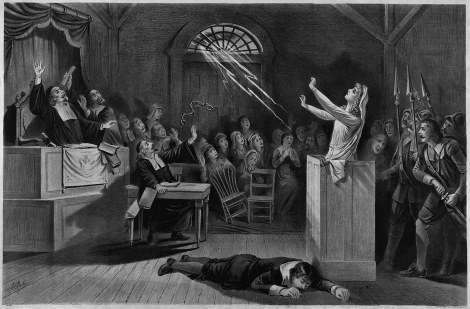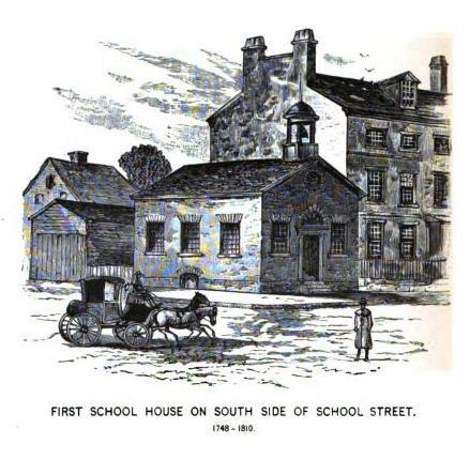In 1675, William Scant of Braintree, Mass., came before the court for breaking a law called the Old Deluder Satan Act: He had refused to educate his children. As a result, the court ordered Braintree’s selectmen to find another home for the Scant children.
Braintree considered ignorance barbaric, as did every other Puritan town. Puritans believed everyone should learn to read so they could study the Scriptures for themselves. They also believed the ‘old deluder Satan’ tricked uneducated people into sinning.
From the beginning, the Puritan colonists valued education. William Bradford, for example, managed to own 400 books in the primitive colony of Plimoth Plantation.
Education was designed to outwit Satan. And it wasn’t an option in Puritan Massachusetts. In 1647, the Massachusetts legislature passed the Old Deluder Satan Act, which required selectmen to make sure parents educated their children.
More than a century later, John Adams drafted the Massachusetts Constitution with a guarantee of public education for all citizens.
Prelude to the Old Deluder Satan Act
The Old Deluder Satan Act followed the first Massachusetts School Law of 1642, passed a mere 12 years after the first Puritans arrived in the howling wilderness of Massachusetts Bay Colony.
The law stated that citizens should read the English language and know the laws of the land. It was aimed at negligent parents and apprentice masters. Selectmen, as well, were to keep a vigilant eye on their neighbors to make sure they didn’t suffer ‘so much barbarism’ as not to teach them how to read.
Further, all parents and masters were to teach their children and apprentices in ‘some honest lawful calling, labour or employment.’ If they failed, and the children became ‘rude, stubborn & unrule,’ the selectmen were to take children from their parents and place them with masters who would discipline them.
Old Deluder Act Passes
The 1642 law wasn’t enforced, which probably inspired the Legislature to pass the Old Deluder Satan Act five years later.
‘One chief project of that old deluder, Satan,’ the law read, was to “keep men from the knowledge of the Scriptures.” The law required every town with more than 50 families to set up a reading school, known as dame schools. Towns with more than 100 families had to run a grammar school in addition to a reading school.
What Happened
Over the next four decades, similar laws to The Old Deluder Satan Act were passed in Plimoth Plantation, New Haven Colony, Connecticut and New Hampshire.
Every town soon had a school, though few had prisons. As a result, Massachusetts children spent twice as much time in school as children in Virginia.
Children attended grammar school all year long for six days a week, except in the summer when they were needed to help on the farm. Most spent six or seven years in school.
They learned from a primer and a hornbook, a printed alphabet sheet attached to a paddle. The most popular, The New England Primer, was published in the late 17th century. It included 26 couplets that taught the alphabet along with religious values.
Rhymes included
The Idle Fool
Is Whipped at schoolJob feels the Rod
Yet blesses God
College Corn
Teachers disciplined schoolchildren with whipping. Sometimes they yoked two young troublemakers together like oxen. They would stick a thick piece of wood called a ‘whispering stick’ into a child’s mouth for talking out of turn.
Some children started their formal education at a very young age. Judge Samuel Sewall sent his son Joseph to a reading school at two years old.
In 1635, even before the Puritans passed the Old Deluder Satan Act, they established North America’s first secondary school, Boston Latin. The school prepared children for Harvard, where they would learn to be ministers or magistrates. They mainly studied Greek and Latin.
Massachusetts asked every family to contribute a peck of grain every year to Harvard. Hundreds of New England families gave ‘college corn’ to support Harvard.
In 1638, Thomas Hooker set up a Latin school in Hartford, now Hartford Public High School. In 1701, 10 ministers founded Yale College, ‘for Publick employment both in Church & Civil State.’
The Act, in fact, established the foundation for public schooling in America, according to historian David Carleton. It set out the principles that the responsibility for basic education belongs to the community or public, he wrote. It also established the principle that the state can require communities to pay for schools and to run them. Finally, it organized schools separating elementary from secondary education.
This story about the Old Deluder Satan Act was updated in 2024. If you’d like to read more about Puritan beliefs, check out the story about Puritan punishments here.




4 comments
[…] England is dotted with famous writers houses, a testament to the Puritan ideal of literacy and the region’s many publishing […]
Do you have a newsletter I can be added to?
[…] in general, for that matter, was compelled by America’s Puritan antecedents. A pair of laws codified in the 1640s insisted children be taught literacy. “The law required every town with more than 50 families to set […]
[…] has had compulsory education since the Old Deluder Satan Act was passed in […]
Comments are closed.